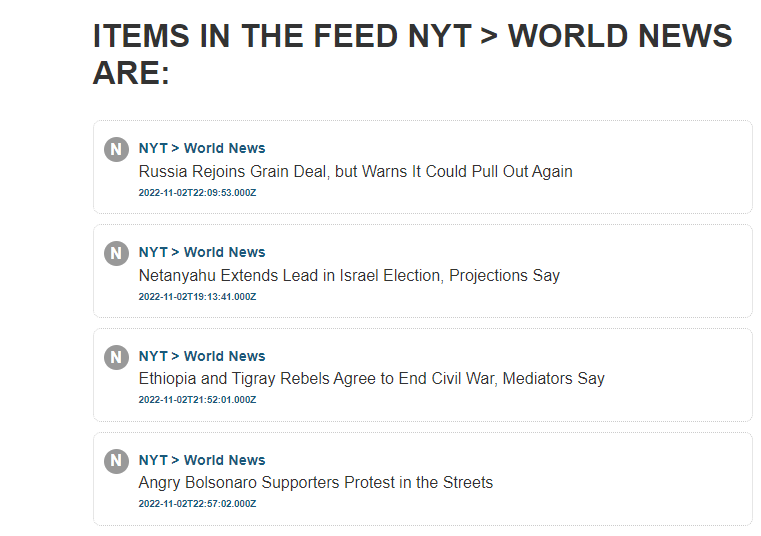This afternoon, I started migrating the feed reading parts of MyStatusTool to my new version with authentication. I was able to get the feed subscription to work, but when the app received a POST from the rssCloud server indicating that a feed had been updated, I saw a POST /feedupdated 403 message. I did some searching on POST routes when using Passport.js, I got the impression that the service doing the posting has to be authenticated. I do not know how to make this work – Lazyweb, help!
April 2023
Watch your quotes when creating JSON files
In using my Glossary Plugin for Micro.blog, John Philpin has noticed that there are two types of double quotes, and that one of them does not produce a valid JSON file or object. There are double quotation marks (like on the keyboard next to the Enter key on my laptop) and double prime marks (think six minutes and 37 seconds 6’37”). If the wrong type of quotes are used, Micro.blog will not render a post using the plugin. A way to check this is to paste your JSON object into a site like JSONLint, which parses the text and can provide feedback on errors (source code for the app available here). Finally more technical info on JSON is available at JSON.org.
Via Ben Werdmuller, read this post about “Open Podcast Standards”, seems like an effort to promote new “tags” within a feed. I hope that their “new” feeds are still compliant RSS 2.0 feeds…
More on Twitter API death watch – saw this post by Ryan Barrett (developer of Bridgy federation tool)(check out Bridgy for Mastodon!) where he references a Twitter Community post that April 29th is the final date for original Twitter API support. Oops! Guess I misread that…. my app is still working, even if WordPress.com is not!
Twitter API death watch – my Portland Protest news river is still flowing, made up mostly of RSS feeds created by a Twitter API app – so much for turning off on March 31…
The subject of organizing in activism
Ken Smith recently wrote about how Rosa Parks was successful because “Rosa Parks had this skill set, these allies, this long-term strategy with her people . . .”. To me, this implies organization, or an organization with goals and plans to achieve those goals. In Jacobin Magazine, Clement Petitjohn writes that social movements in the US have typically relied on “professional organizers”, while in France this formal role is scarce. Quote: “This doesn’t mean that no organizing is done in France, of course. It just points to the fact that the various tasks associated with organizing work break down differently in France and in the United States.”. Petitjohn has a new book from Haymarket Press titled “Occupation: Organizer – A Critical History of Community Organizing in America”, based on research he did for his PhD at the University of Chicago. The Guardian newspaper has a recent article on the efforts of the French unions on protest the raising of the national retirement age.
For other looks at organizing, Joe Burns’ recent book Class Struggle Unionism “draws on years of labor activism and study of labor tradition … and outlines the key set of ideas common to class struggle unionism and shows how these ideas can create a more militant, democratic and fighting labor movement. “. Finally, for people trying to figure out where they might participate as an activist, Hillary Rettig’s book The Lifelong Activist “…is based on my many years’ experience as an activist and coach: work in which I learned which personal habits, thoughts and beliefs tend to help people succeed at ambitious goals, and which don’t.”. This book is now available free online.
Update on MyStatusTool development
The MyStatusTool project was on hold for a period of weeks while I was developing a glossary plugin for Micro.blog (and specifically for John Philpin). That appears to be working at least for John and me, so I am resuming work on this project. In conversations with Colin Walker (developer of MST-PHP), I am planning to move to update my user interface to match Colin’s, so our tools will be more common to users. I made a start on this by getting the simple version of username/password authentication using Passport.js set up (since my initial version did not have this). I have also spent some time familiarizing myself with how MST-PHP styles its user interface. The following is my projected list of tasks:
Login feature (in progress)
Display static set of feed items on home page
Display items on login page
Read feeds, add to posts file, update display on home and login page
Create admin page to manage feeds
Add posting feature and create a feed for posts
Add static pages for each post
My thoughts on the current AI explosion
For some time now, people have been exploring public AI models like DALL-E and GPT-3/GPT-4. From the software development standpoint, it appears that with the correct prompts, these models can generate source code that can do 80-90% of what you want (for specific tasks). Simon Willison has a great walkthrough of one of his experiments. Another area is training models on your own data. Dave Winer is working with Chat Thing to create his own personal chatbot which can answer questions about the content he has published since 1994 (Ton Ziljstra has shared some thoughts on this topic). I don’t think that these types of applications will be replacing programmers just yet, but they are already helping programmers be more productive. The uptick of people using these apps to create content is somewhat troubling, I would say the “jury is still out” on those types of use cases.
